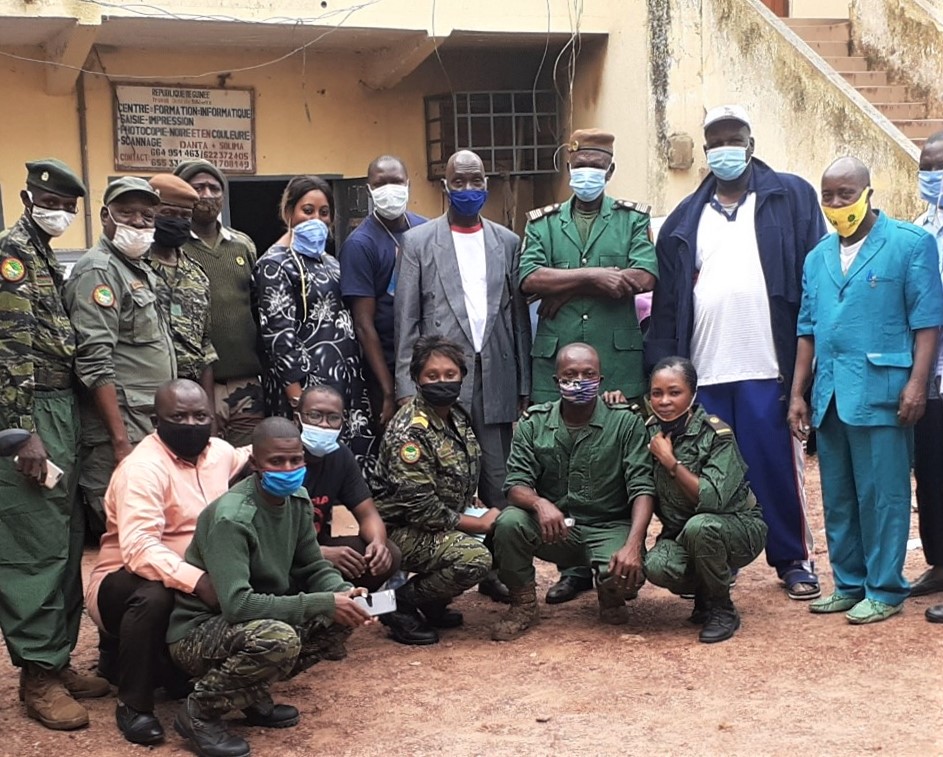


A call can come at any time, and for Mamadou Barry, a data manager at the Guinean Office of Parks and Reserves (OGUIPAR), it is usually not good news. This time a group of baboons and patas monkeys are found dead inside a natural park, the cause unknown. He needs to react quickly and arrange for a wildlife investigation to verify the cause of death. It could be the start of an animal disease outbreak and recognizing one is an integral part of Mamadou’s job surveying wildlife in Guinea.
Figure 1 Moyen Bafing National Park in Guinea © OGUIPAR/M.Barry
When conservationists find groups of dead or sick animals in a protected area, wildlife investigations seek to identify the cause from diverse possibilities. Poachers, pesticides, or a deadly virus? Mamadou joins these investigations to verify reports on animal deaths for national environmental surveillance networks. He carefully looks for any indication of epidemiologic disturbance that could signal a new outbreak within one or several animal species. Certain outbreaks in animals could lead to a possible disease spillover event to humans. The success of these investigative missions relies on the capacities of many professionals in the wildlife surveillance chain. This includes conservationists in parks and reserves, national Veterinary Services, epidemiological scientists, national data managers, and more, each profession requiring specific training and upkeep.
The EBO-SURSY Project, led by the OIE, promotes the value of wildlife surveillance, and understands the necessity of capacity trainings for animal, human and ecological health professionals. Working with professionals like Mamadou, the project helps keep their skills sharp and promotes the comprehensive One Health concept. One Health is an approach that highlights the inherent interconnectedness and co-dependency of humans, animals, and ecosystems. Planetary and animal health are critical for human health as it is estimated that 60% of existing human infectious diseases are zoonotic, and at least 75% of emerging infectious diseases derive from an animal source.
In October 2019, The EBO-SURSY Project and partners IRD, CIRAD and Institut Pasteur integrated One Health into the core of a capacity building training program in Guinea. It focused on the surveillance of the Ebola virus and other viral haemorrhagic fevers while applying the One Health approach to increase the prevention, detection, and control of emerging of zoonotic diseases. Professionals from all stages of the surveillance chain participated, including Mamadou Barry who followed a module on the ecology of zoonoses which complemented his professional interactions with wildlife. As a part of this module, Mamadou participated, alongside the national Veterinary Services, in CIRAD’s practical training on the field sampling of bats for viruses including Ebola. Identified by his managers within the Ministry of Environment, he was considered a prime candidate because he oversees the entry of wildlife investigation data into the national Guinean One Health platform.
Figure 2 Mamadou Barry (left) attends the EBO-SURSY Project One Health training in Guinea 2019. He works together with other professionals from animal, human and ecological health sectors. ©OIE/ S. Muset
For Mamadou, training did not stop with the close of EBO-SURSY’s capacity building event. Striving to strengthen Guinea’s wildlife surveillance from the ground up, Mamadou thought of new ways he could improve the system from his role within the environmental sector. He identified colleagues, such as Guinea’s forestry services and conservationists, who work directly with wildlife in nature parks and protected areas to learn the concepts of One Health, virus ecology and the prevention of zoonotic diseases. Using the EBO-SURSY Project’s technical diseases factsheets as visual aids, he helped wildlife workers recognize signs of Lassa Fever, Ebola and Marburg and the ecological principles of their viral transmission.
Mamadou observes that in the field “there is a critical need for basic trainings, such as in epidemiology and health ecology. Many conservationists can identify different animal species, but not animal diseases nor public health organisations needed for outbreak prevention”. In 2019 he reached 120 conservationists across five protected zones with his trainings. In 2020, despite the difficulties faced by the COVID-19 pandemic, he employed social distancing methods and trained an additional 90 conservationists in four protected zones. As he sees it, building their skills is paramount because “their work in the early detection of zoonotic diseases is fundamental for a rapid and efficient response by animal and human health systems”.
After investigating the baboons and patas monkeys, Mamadou learned that contaminated water from nearby mining operations was responsible for their deaths. It is unfortunate, but a relief that there is no ongoing disease outbreak. Like in all countries, One Health collaborations are needed across sectors to further protect animals and environment. For his part, Mamadou will continue to support conservationist education and training and to investigate suspicious animal deaths for surveillance platforms. Meanwhile, the EBO-SURSY Project aims to continue its efforts to build professional capacities at all levels of the surveillance network, hoping to inspire and encourage more One Health champions like Mamadou.
Figure 3. Mamadou holds a training for nature curators and wildlife managers from nature reserves and other biodiverse sites in Kindia, Guinea in July 2020. © OGUIPAR/M.Barry
READ MORE: visit the EBO-SURSY Project website
With the financial support of the European Union, the OIE-led EBO-SURSY project implemented in coordination with CIRAD, IRD and the Institut Pasteur, aims to reinforce the capacity of national Veterinary Services in ten West and Central African countries to monitor and respond to the Ebola virus as well as four other haemorrhagic fevers – Marburg virus disease, Rift Valley Fever, Crimean-Congo haemorrhagic fever, and Lassa fever. These five illnesses are zoonoses or diseases that can spread from animals to humans.



